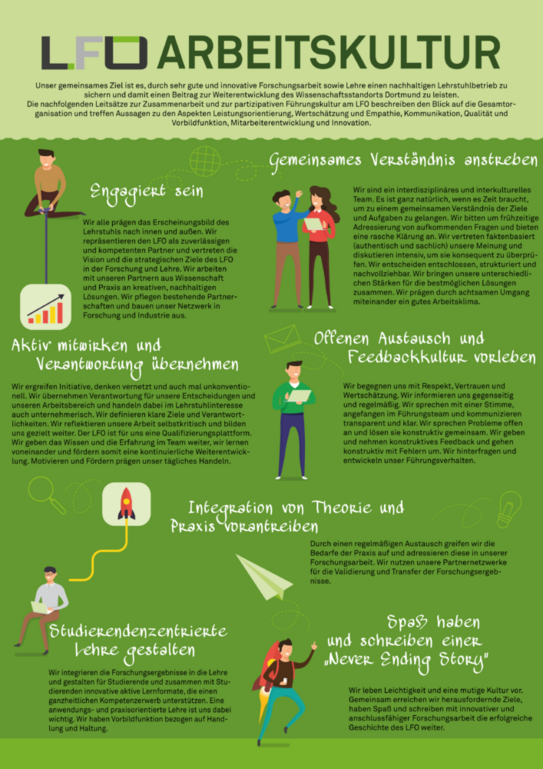The working culture at the LFO
Our common goal is to ensure sustainable chair operations through excellent and innovative research work and teaching, thereby contributing to the further development of Dortmund as an academic location.
The following guiding principles on cooperation and participative management culture at the LFO describe the view of the entire organization and make statements on the aspects of performance orientation, appreciation and empathy, communication, quality and role model function, employee development and innovation.
Our mission statement
The Chair of Enterprise Logistics (LFO) continues the more than 50 years of work of the Chair of Factory Organization at the Technical University of Dortmund and expands it to include aspects of comprehensive supply chain management.
The chair stands for basic and applied research and teaching in corporate logistics and supply chain management. Corporate logistics and supply chain management address similar and overlapping tasks in production, purchasing and logistics, but cannot be clearly distinguished from one another. While supply chain management focuses on the integrated, comprehensive, customer- and demand-oriented planning and control of internal and external logistics and production networks, corporate logistics focuses more on the logistical tasks of technical operations management at site level through to questions of factory organization or maintenance management. The perspective of both specialist areas is necessary for the complete penetration of the logistical activities of a company and its value creation networks in the sense of an integrated management approach to corporate management in value creation networks.
The Chair's fields of work also follow this integrated and holistic understanding of tasks: supply chain management and purchasing, factory planning and operation, maintenance and service management as well as competence management and innovative learning concepts. In teaching, we offer our students a wide range of courses in this regard.
Approximately 100 successfully completed Bachelor's and Master's theses each year, most of which are written in direct cooperation with companies, demonstrate the practical orientation of our teaching in the Logistics, Industrial Engineering and Mechanical Engineering degree courses.
There are also established international university partnerships, such as with the Georgia Institute of Technology, Tongji University and Stellenbosch University, which are currently being expanded and extended.
As the founding chair of the Graduate School of Logistics, which is a unique institution in Germany with its concept of purely third-party-funded doctoral training, primarily by renowned German companies, the LFO has been involved in the academic supervision of business-funded doctoral students since 2009. In collaboration with companies, cooperative interdisciplinary research on current logistics topics is strengthened and the intensive exchange between science and practice is promoted.
The employees of the chair are united by their interest and passion for the permanent development and transfer of new knowledge to strengthen competitiveness in logistics, purchasing, production and maintenance. The Chair of Enterprise Logistics contributes to logistics research together with its research partners in Dortmund, such as the Fraunhofer Institute for Material Flow and Logistics (IML), the institutes and chairs in the Production and Logistics department of the Faculty of Mechanical Engineering, as well as a large number of other interdisciplinary partners within and outside TU Dortmund University. The LFO's working methods are characterized by openness to the perspectives of other disciplines in the sense of interdisciplinarity, consistent integration into its own work and an overarching view of logistics.
In research, the chair team works on innovative topics for the further development of methods, concepts and instruments of corporate logistics and supply chain management. The focus is on the complementary linking of technology and management topics for the success-oriented further development of companies in the design fields of "technology", "organization", "IT" and "people". Hybrid business models and the platform economy present companies with new challenges. The efficient and effective design, planning and control of increasingly digitalized processes and systems, with an integrated view of all design fields, are the focus of current research activities.
An important goal and result of this research work is the economically evaluated utilization of new technologies such as distributed ledger technologies (e.g. blockchain), artificial intelligence (e.g. machine learning) and feasible management solutions for practical use in logistics, purchasing, production and maintenance. This applies to corporate logistics and supply chain management in general and to digitalization (especially "Industry 4.0") and its management ("Management of Industry 4.0") in particular. In this context, the Dortmund Management Model has emerged in recent years, which structures the digital transformation in corporate logistics and supply chain management, identifies the need for further research and enables an integrated, process-oriented analysis of the new management tasks. In the "Smart Factory" as the core of Industry 4.0, the connection to the chair's previous work is again expressed and is consistently continued in the development of self-control procedures and adaptive adjustment processes for the planning and realization of adaptation-intelligent factories.
For the realization of autonomization, digitalization and individualization as basic principles of Industry 4.0, adaptive value creation networks based on the factory and its systems as elementary individual components of the supply chain must be developed in order to promote adaptability and resilience along supply chains. The understanding of process orientation developed at the Chair over many years is an essential basis for the organization and management of adaptable value networks.
The current focus is on investigating the potential of additive manufacturing technologies as well as augmented and virtual reality, which can be used at various points in the value creation processes of company networks.
In order to successfully integrate new technologies and shape the digital transformation, the chair team also analyses human-centred process design, new solutions for shaping organizational change and competence-oriented qualification with new game-based approaches, such as gamification and serious games.
Suitable and new management approaches for the self-control and self-organization of logistics, purchasing, production and maintenance must be (further) developed for the forthcoming comprehensive change in value creation. This applies to large companies, but especially to small and medium-sized enterprises (SMEs).
These management approaches will be established in logistics assistance systems as well as in tools for decision support, qualification and empowerment of users. This also includes the further development of management-relevant key performance indicators (KPIs). In this area, the chair will strengthen empirical research and, for example, carry out benchmarking studies and case analyses with practice partners.
The research work of the Chair of Enterprise Logistics therefore focuses on the management implications of logistics tasks for corporate management and in particular the following key areas, which are included in the strategic initiatives "Silicon Economy" and "Blockchain Europe":









